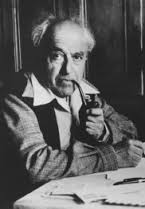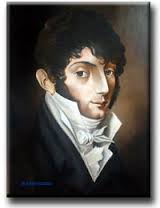July 24, 2016. Minor notables. Ernest Bloch, a Swiss-American composer, was born this day in 1880 in Geneva. He went to Brussels to study violin with Eugène Ysaÿe. He began composing at the age of nine, and took formal classes in Frankfurt in 1900. He moved to Paris and then back to Geneva where he married and joined his father’s business as a bookkeeper and salesman. He continued to compose, sporadically, kept up his musical connection and in 1916 went on a tour of the United States with a dance company as a conductor. The tour was a failure but Bloch was offered a position at the newly organized David Mannes College of Music in New York. Around that time he composed what would become his best known composition, Schelomo,Rhapsodie Hébraïque for Cello and Orchestra, the final work of his “Jewish cycle” (Bloch was Jewish). It was well received and remains popular to this day. In 1920 he became the founding director of the Cleveland Institute of Music, where he served for five years. In 1925 he moved to San Francisco to lead the local conservatory. In the 1930s Bloch lived mostly in Switzerland but returned to the US in 1940. He taught at Berkeley and continued to compose. Bloch died on July 15th of 1959. Here’s a recording of Schelomo made by Mstislav Rostropovich in 1977. Leonard Bernstein is leading the Orchestre National De France.
John Field, Irish composer and pianist, was born on July 26th of 1782. The “father” of the Nocturne, and in that Chopin’s precursor (on a much smaller scale), Field moved to London to study with Muzio Clementi. He soon became famous as a young virtuoso; Haydn, during one of his trips in London, heard him play and praised him in his notebook: “Field a young boy, which plays the piano extremely well.” In 1802 Field followed his teacher Clementi to Russia. Clementi, a composer and a pedagogue, was also in the piano business, and used Field to demonstrate pianos to potential customers. Clementi left Russia in 1803 but Field stayed behind. He played numerous concerts, first in St.-Petersburg and then in the Baltics and Moscow. In 1806 he moved to Moscow and lived there for five years, eventually returning to St.Petersburg. Popular not just as a concert pianist but as a private tutor, he became the most expensive piano teacher in Russia. In 1810 he married one of his pupils, a French actress and pianist named Adelaide Percheron. The 1810s was a productive period when he wrote most of his nocturnes. They would later be much admired by Chopin and Liszt. The feeling was not reciprocal, as Field was critical of both. Field stayed in Russia till 1831 when he went to London for an operation: he had rectal cancer. After the operation, he unsuccessfully tried to resurrect his pianistic career. He ended up in a hospital in Naples, penniless, and had to be rescued by his Russian friends who brought him back to Moscow. There he died on January 23rd of 1837. Here’s John O’Connor playing Field’s Nocturne no. 5 in B-flat Major.
If Field was famous for his piano music, who was born one year earlier, on July 27th of 1781, became famous for his music for the guitar. The early 19th century, the time Giuliani was growing up, was aperiod of deep decline in classical music in Italy. The only musical form that was flourishing was the opera. So, as many of his compatriots, the young Giuliani moved up north and settled in Vienna. Even though his first instrument was the cello, he became famous as the greatest guitar virtuoso, acknowledged by musicians and the court. He was one of the first to compose and perform a concerto for the guitar and symphony orchestra. He became acquainted with all of the prominent musician of Vienna, starting with Beethoven. He performed chamber concerts with the best local musicians, and composed, mostly for the guitar. In 1819 he returned to Italy, first to Rome and then to Naples. That’s where he died, on May 8th of 1829, just 47 years old. Here’s his Prelude op.83 no. 2, performed by Dmitry Teslov.
Minor notables, 2016
July 24, 2016. Minor notables. Ernest Bloch, a Swiss-American composer, was born this day in 1880 in Geneva. He went to Brussels to study violin with Eugène Ysaÿe. He began composing at the age of nine, and took formal classes in Frankfurt in 1900. He moved to Paris and then back to Geneva where he married and joined his father’s business as a bookkeeper and salesman. He continued to compose, sporadically, kept up his musical connection and in 1916 went on a tour of the United States with a dance company as a conductor. The tour was a failure but Bloch was offered a position at the newly organized David Mannes College of Music in New York. Around that time he composed what would become his best known composition, Schelomo, Rhapsodie Hébraïque for Cello and Orchestra, the final work of his “Jewish cycle” (Bloch was Jewish). It was well received and remains popular to this day. In 1920 he became the founding director of the Cleveland Institute of Music, where he served for five years. In 1925 he moved to San Francisco to lead the local conservatory. In the 1930s Bloch lived mostly in Switzerland but returned to the US in 1940. He taught at Berkeley and continued to compose. Bloch died on July 15th of 1959. Here’s a recording of Schelomo made by Mstislav Rostropovich in 1977. Leonard Bernstein is leading the Orchestre National De France.
the age of nine, and took formal classes in Frankfurt in 1900. He moved to Paris and then back to Geneva where he married and joined his father’s business as a bookkeeper and salesman. He continued to compose, sporadically, kept up his musical connection and in 1916 went on a tour of the United States with a dance company as a conductor. The tour was a failure but Bloch was offered a position at the newly organized David Mannes College of Music in New York. Around that time he composed what would become his best known composition, Schelomo, Rhapsodie Hébraïque for Cello and Orchestra, the final work of his “Jewish cycle” (Bloch was Jewish). It was well received and remains popular to this day. In 1920 he became the founding director of the Cleveland Institute of Music, where he served for five years. In 1925 he moved to San Francisco to lead the local conservatory. In the 1930s Bloch lived mostly in Switzerland but returned to the US in 1940. He taught at Berkeley and continued to compose. Bloch died on July 15th of 1959. Here’s a recording of Schelomo made by Mstislav Rostropovich in 1977. Leonard Bernstein is leading the Orchestre National De France.
John Field, Irish composer and pianist, was born on July 26th of 1782. The “father” of the Nocturne, and in that Chopin’s precursor (on a much smaller scale), Field moved to London to study with Muzio Clementi. He soon became famous as a young virtuoso; Haydn, during one of his trips in London, heard him play and praised him in his notebook: “Field a young boy, which plays the piano extremely well.” In 1802 Field followed his teacher Clementi to Russia. Clementi, a composer and a pedagogue, was also in the piano business, and used Field to demonstrate pianos to potential customers. Clementi left Russia in 1803 but Field stayed behind. He played numerous concerts, first in St.-Petersburg and then in the Baltics and Moscow. In 1806 he moved to Moscow and lived there for five years, eventually returning to St.Petersburg. Popular not just as a concert pianist but as a private tutor, he became the most expensive piano teacher in Russia. In 1810 he married one of his pupils, a French actress and pianist named Adelaide Percheron. The 1810s was a productive period when he wrote most of his nocturnes. They would later be much admired by Chopin and Liszt. The feeling was not reciprocal, as Field was critical of both. Field stayed in Russia till 1831 when he went to London for an operation: he had rectal cancer. After the operation, he unsuccessfully tried to resurrect his pianistic career. He ended up in a hospital in Naples, penniless, and had to be rescued by his Russian friends who brought him back to Moscow. There he died on January 23rd of 1837. Here’s John O’Connor playing Field’s Nocturne no. 5 in B-flat Major.
If Field was famous for his piano music, who was born one year earlier, on July 27th of 1781, became famous for his music for the guitar. The early 19th century, the time Giuliani was growing up, was aperiod of deep decline in classical music in Italy. The only musical form that was flourishing was the opera. So, as many of his compatriots, the young Giuliani moved up north and settled in Vienna. Even though his first instrument was the cello, he became famous as the greatest guitar virtuoso, acknowledged by musicians and the court. He was one of the first to compose and perform a concerto for the guitar and symphony orchestra. He became acquainted with all of the prominent musician of Vienna, starting with Beethoven. He performed chamber concerts with the best local musicians, and composed, mostly for the guitar. In 1819 he returned to Italy, first to Rome and then to Naples. That’s where he died, on May 8th of 1829, just 47 years old. Here’s his Prelude op.83 no. 2, performed by Dmitry Teslov.
who was born one year earlier, on July 27th of 1781, became famous for his music for the guitar. The early 19th century, the time Giuliani was growing up, was aperiod of deep decline in classical music in Italy. The only musical form that was flourishing was the opera. So, as many of his compatriots, the young Giuliani moved up north and settled in Vienna. Even though his first instrument was the cello, he became famous as the greatest guitar virtuoso, acknowledged by musicians and the court. He was one of the first to compose and perform a concerto for the guitar and symphony orchestra. He became acquainted with all of the prominent musician of Vienna, starting with Beethoven. He performed chamber concerts with the best local musicians, and composed, mostly for the guitar. In 1819 he returned to Italy, first to Rome and then to Naples. That’s where he died, on May 8th of 1829, just 47 years old. Here’s his Prelude op.83 no. 2, performed by Dmitry Teslov.